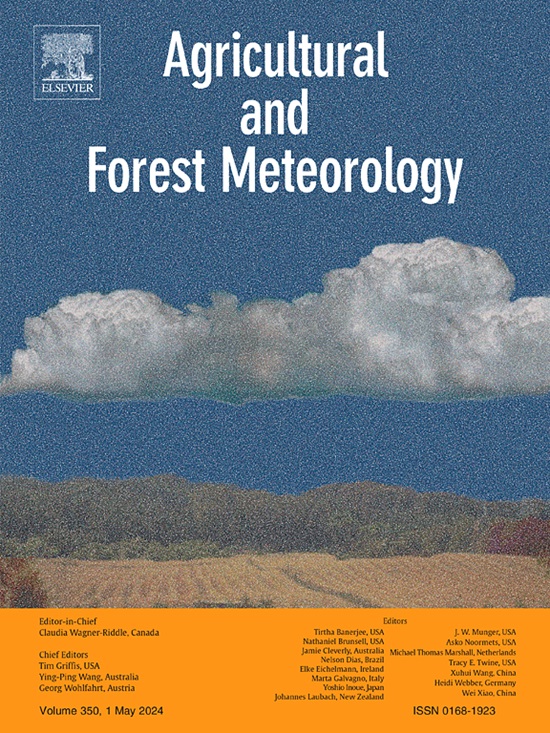在耕地和森林中,累积的土壤水分亏损对总初级生产力和光利用效率的影响比滞后的土壤水分亏损更大
IF 5.6
1区 农林科学
Q1 AGRONOMY
引用次数: 0
摘要
许多研究都强调了干旱对生态系统的影响,一些研究人员还报告了累积土壤水分亏缺(ASMD)对草地光利用效率(LUE)的影响。然而,ASMD 对耕地和森林生态系统的总初级生产力(GPP)和光利用效率的潜在影响仍不清楚。本研究通过对干旱年份的 10 个耕地和 25 个森林通量观测点的观测,阐明了累积和滞后土壤水分亏缺(分别为 ASMD 和 LSMD)对这两个生态系统的 GPP 和 LUE 的影响。结果表明,ASMD 和 LSMD 对耕地和森林 LUE/GPP 的影响明显超过同期效应(CSMD)。在耕地中,CSMD/LSMD/ASMD 对 LUE 的平均 R2 分别为 0.22、0.47、0.56,对 GPP 的平均 R2 分别为 0.29、0.54、0.74。对于森林,CSMD/LSMD/ASMD 与 LUE 之间的平均 R2 分别为 0.21、0.36 和 0.46,与 GPP 之间的平均 R2 分别为 0.34、0.63 和 0.65。此外,ASMD 和 LSMD 对 LUE 的影响在耕地中比在森林中更明显,而且在耕地和森林中,ASMD 的影响比 LSMD 的影响更强。本研究强调了 ASMD 在影响耕地和森林的 LUE 和 GPP 方面的关键作用,从而为将 ASMD 纳入 LUE 模型以提高 GPP 模拟的准确性(尤其是在干旱时期)提供了理论依据。本文章由计算机程序翻译,如有差异,请以英文原文为准。
Stronger effects of accumulated soil moisture deficit on gross primary productivity and light use efficiency than lagged soil moisture deficit for cropland and forest
Many studies have underscored the impacts of drought on ecosystems, and some researchers reported the effects of accumulated soil moisture deficit (ASMD) on light use efficiency (LUE) in grassland. However, the potential effects of ASMD on gross primary productivity (GPP) and LUE for both cropland and forest ecosystems are still not understood. This study elucidated the effects of accumulated and lagged soil moisture deficit (ASMD and LSMD, respectively) on GPP and LUE in these two ecosystems by using observations from 10 cropland and 25 forest flux sites during drought years. The results showed that the effects of ASMD and LSMD on LUE/GPP for both cropland and forests obviously surpass the concurrent effects (CSMD). For cropland, the mean R2 between CSMD/LSMD/ASMD with LUE were 0.22, 0.47, 0.56, respectively, and were 0.29, 0.54, 0.74 with GPP, respectively. For forest, the mean R2 between CSMD/LSMD/ASMD with LUE were 0.21, 0.36, 0.46, respectively, and were 0.34, 0.63, and 0.65 with GPP, respectively. Additionally, the effects of ASMD and LSMD on LUE are more pronounced for cropland than for forests, and for both cropland and forest, the effect of ASMD is stronger than that of LSMD. This study underscores the crucial role of ASMD in influencing LUE and GPP for cropland and forests, thereby offering a theoretical foundation for incorporating ASMD into LUE models to enhance the accuracy of GPP simulations, especially during drought periods.
求助全文
通过发布文献求助,成功后即可免费获取论文全文。
去求助
来源期刊
CiteScore
10.30
自引率
9.70%
发文量
415
审稿时长
69 days
期刊介绍:
Agricultural and Forest Meteorology is an international journal for the publication of original articles and reviews on the inter-relationship between meteorology, agriculture, forestry, and natural ecosystems. Emphasis is on basic and applied scientific research relevant to practical problems in the field of plant and soil sciences, ecology and biogeochemistry as affected by weather as well as climate variability and change. Theoretical models should be tested against experimental data. Articles must appeal to an international audience. Special issues devoted to single topics are also published.
Typical topics include canopy micrometeorology (e.g. canopy radiation transfer, turbulence near the ground, evapotranspiration, energy balance, fluxes of trace gases), micrometeorological instrumentation (e.g., sensors for trace gases, flux measurement instruments, radiation measurement techniques), aerobiology (e.g. the dispersion of pollen, spores, insects and pesticides), biometeorology (e.g. the effect of weather and climate on plant distribution, crop yield, water-use efficiency, and plant phenology), forest-fire/weather interactions, and feedbacks from vegetation to weather and the climate system.

 求助内容:
求助内容: 应助结果提醒方式:
应助结果提醒方式:


